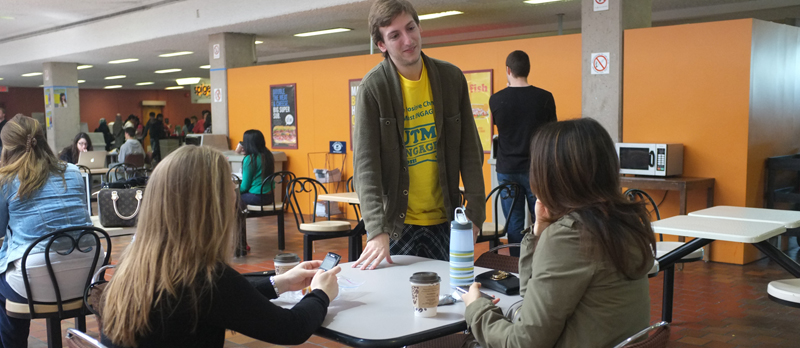According to the unofficial results, UTM Engage won the election with the lowest voter turnout of the last three years.
About 17% of UTM students cast ballots. Independent candidate Thomas Kristan lost to UTM Engage’s Yasmine Youssef for the position of VP equity by nearly 1,000 votes. For the unopposed positions of president, VP external, VP internal, and VP university affairs, more students abstained from the vote than those that voted “no”.
In particular, participation was low in the election for the UTMSU Board of Directors. With seven positions available on Division III, only seven candidates ran for a seat. Division II originally had five candidates running for four available positions, but Sarah Gong withdrew before the polls closed. Gong stated that she wants to concentrate on her studies next year.
Division IV includes two positions for managing the affairs of part-time students, who do not pay membership fees to UTMSU. (Part-time students are represented by Erindale Undergraduate Part-time Students.) Only one candidate ran for a position, leaving one seat open for a by-election next term.
The newly created Division V includes one seat from professional faculties, including the Mississauga Academy of Medicine. One candidate ran for the position; the results will be announced Monday afternoon.
Unlike the highly controversial elections between Unity, Students First, and an independent candidate for the University of Toronto Students’ Union, there were no formal complaints submitted to the Chief Returning Officer. The CRO is a hired position responsible for overseeing and enforcing the rules of the election.
According to CRO Babatumi Sodade, there were verbal complaints about campaign materials left at the polling stations. UTM Engage flyers were found inside the polling booths. Sodade informed the poll clerks that flyers were not permitted at the booths and should be discarded immediately. He then approached UTM Engage, who were campaigning with flyers at the edge of the polling station areas, and informed them that students cannot bring campaign material to the booths.
“Some [students] would say, ‘I need this to vote; can I have it?’ and the poll clerks would tell them to hide it. But when I’d make my rounds I’d find flyers left behind the voting screens,” Sodade said. “I told UTM Engage that students would have to throw it out right before they get to the voting station. At first, [UTM Engage] were saying that people need the flyers because the people that they talked to needed to see their names to vote.”
The Board of Directors is meant to oversee the finances of UTMSU and hold them accountable to students. This year, many of the Board of Directors candidate statements included the same “engage” comments as the slate.
The Elections Procedures Code was changed this year to allow cross-campaigning. In previous years, candidates for the Board of Directors and executive positions of UTMSU were not allowed to associate their campaigns with each other to gain support.
Although incumbent UTMSU president Gilbert Cassar was unaware of the change or the reason, he supported the amendment.
“In my personal opinion, a slate represents individuals united around common values and objectives, which makes for more cohesiveness within a working environment,” Cassar said. “In my opinion, allowing cross-campaigning allows for the freedom of affiliating oneself with another that shares the same values as you.”
Regardless, Sodade enforced limitations on cross-campaigning at his own discretion.
UTM Engage and Kristan were invited to a discussion with The Medium. UTM Engage turned down the opportunity, stating they wanted to spend the time campaigning.
“We all have the right to speak, which also implies the freedom of not speaking. The debate is there and the posters are there. They’re available and you can see them walking around. If the people have questions they can go up to them,” Sodade said. “But I would expect that the prime minister would speak to and be involved with the media.”
The highest recent voter turnout was two years ago when two slates (both led by incumbent executives) and an independent candidate ran for executive positions.

